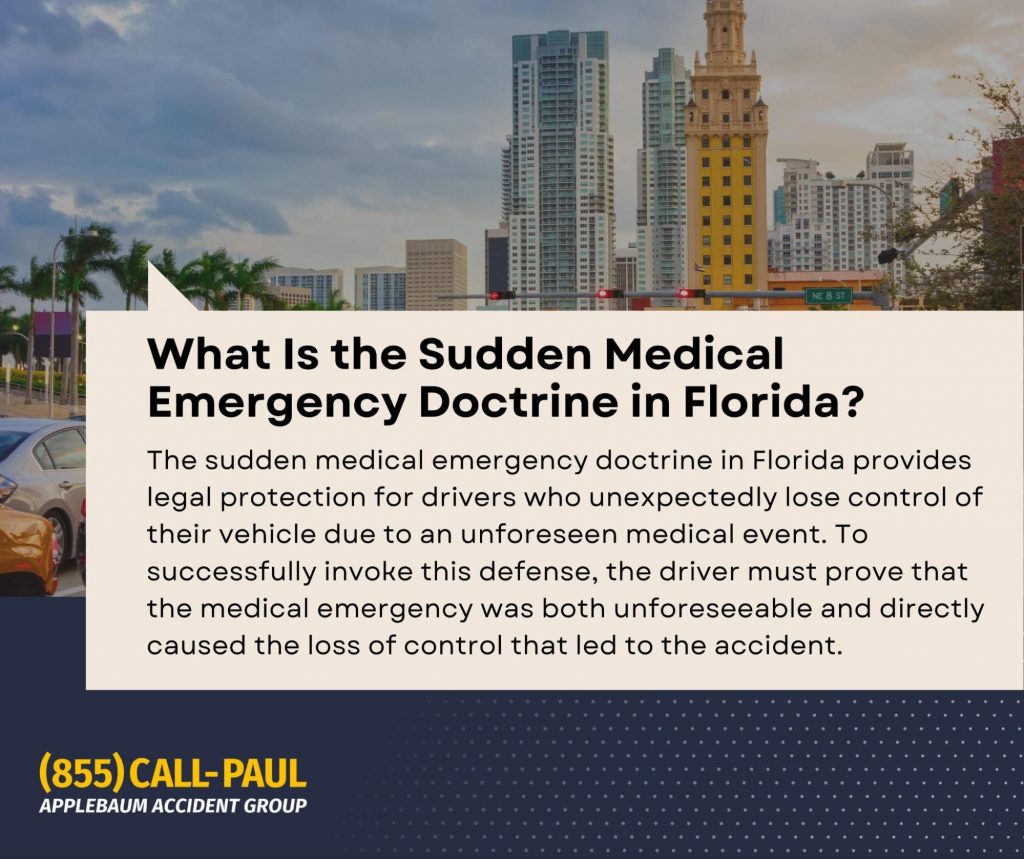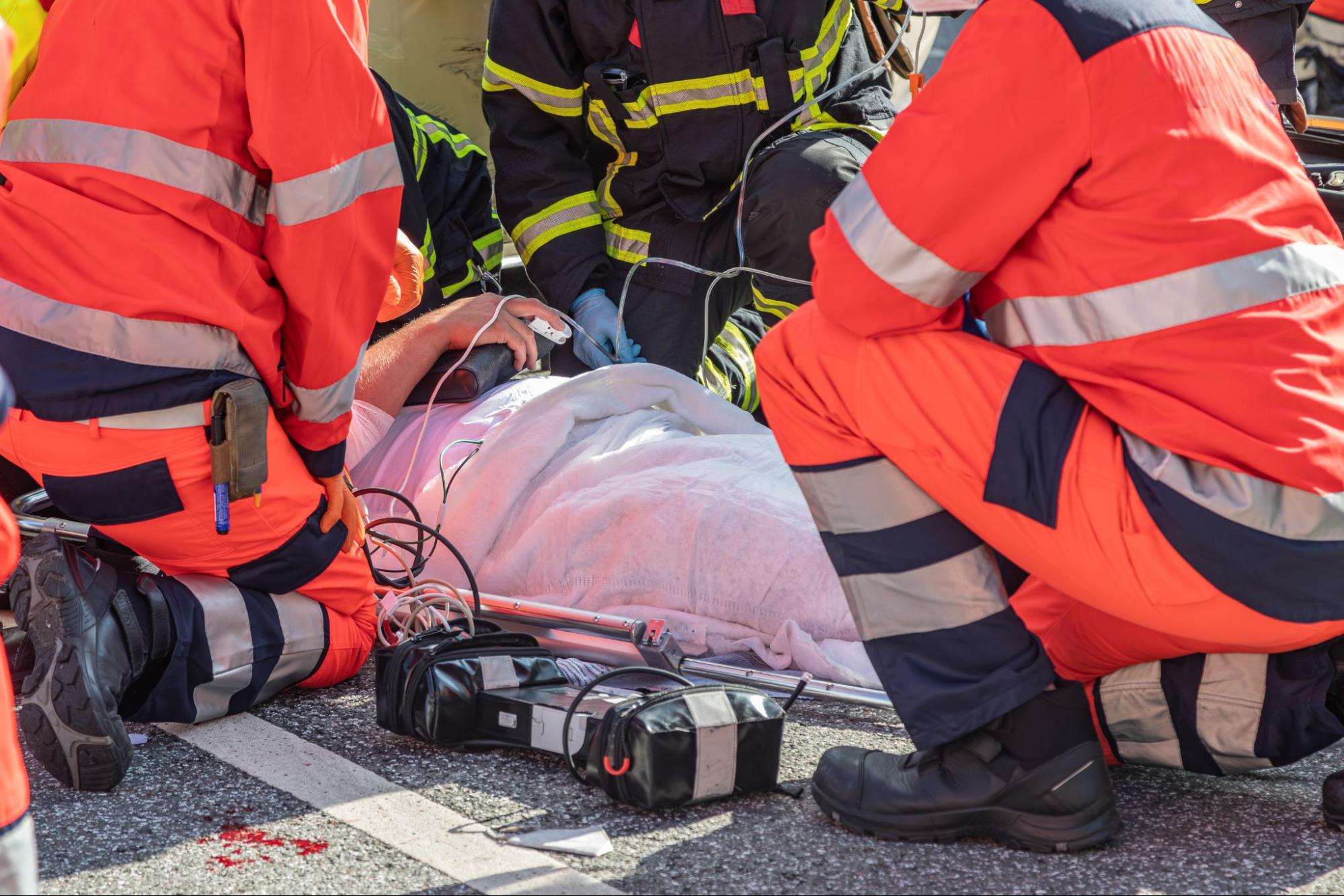The sudden medical emergency doctrine in Florida protects drivers from liability if an unforeseen medical event, like a seizure or heart attack, causes an accident. This defense can block claims, but it must meet strict legal standards about foreseeability and reasonableness.
Florida’s sudden medical emergency doctrine can dramatically change the outcome of a car accident case. If a driver experiences an unexpected medical crisis, like a seizure or heart attack, and causes an accident, they may be shielded from legal responsibility.
This means the driver might avoid paying damages, leaving injured victims to navigate other legal and insurance options.
In this article, you’ll learn:
- How this doctrine operates,
- How it differs from emergency medical conditions (EMC),
- Sudden medical emergency doctrine’s connection to Florida’s 51% comparative fault rule
- How an at-fault driver’s insurance policy limits can influence your settlement
Let’s dive in.
What Is the Sudden Medical Emergency Doctrine in Florida?

The sudden medical emergency doctrine in Florida provides legal protection for drivers who unexpectedly lose control of their vehicle due to an unforeseen medical event. To successfully invoke this defense, the driver must prove that the medical emergency was both unforeseeable and directly caused the loss of control that led to the accident.
This defense is often raised in cases involving medical conditions such as seizures, fainting, or heart attacks.
Can this doctrine fully absolve a driver of liability? Sometimes, yes, but only when the evidence clearly shows that the driver had no prior warning or ability to prevent the medical episode.
What Qualifies as a Sudden Emergency in Florida?
The term “sudden emergency” in Florida law broadly covers any unforeseen event that demands immediate action from a driver. This might include swerving to avoid road debris, an animal darting into the roadway, or even mechanical failure.
However, a sudden medical emergency is more specific, referring solely to health-related incapacitations such as strokes, seizures, or heart attacks. These scenarios differ from general emergencies in that they involve an unexpected physical or physiological event that renders the driver incapable of maintaining control.
It’s important to note that not every crash defense qualifies as a sudden emergency. Courts carefully evaluate whether the driver’s response was reasonable and whether the event was genuinely unpredictable.
How Florida Law Defines a Medical Emergency
For a medical event to qualify under the sudden medical emergency doctrine, it must meet three criteria: it must be sudden, unforeseen, and incapacitating. If the driver had prior knowledge of a medical condition that increased the likelihood of such an episode, the defense may not apply.
This highlights a critical issue, medical documentation. Failing to preserve hospital records or obtain diagnostic reports can severely hinder a driver’s ability to assert this defense. Without clear evidence, courts may reject claims of sudden incapacity.
Additionally, known pre-existing conditions, such as chronic seizures, often disqualify the use of this defense, particularly if the driver was advised not to operate a vehicle.
What Is an Emergency Medical Condition (EMC) in Florida?
In Florida’s personal injury protection (PIP) insurance system, an Emergency Medical Condition (EMC) is a critical designation. Under the state’s 14-day rule, individuals involved in car accidents must seek medical care within two weeks to qualify for PIP benefits. An EMC is a medical condition that, if left untreated, could reasonably be expected to result in serious jeopardy to the patient’s health.
However, it’s essential to distinguish this from the sudden medical emergency doctrine. EMCs relate to insurance benefits and are used to trigger access to higher coverage limits within a PIP policy. They do not directly influence questions of legal liability in a car accident case.
This distinction clears up a frequent misconception: an EMC does not equal a sudden medical emergency defense.
Key Differences Between EMC and Sudden Medical Emergency Defense
The EMC designation determines whether an accident victim is eligible for enhanced PIP coverage, whereas the sudden medical emergency defense addresses the question of legal fault.
An individual might suffer an EMC and be entitled to PIP benefits, yet still face legal liability for an accident if their condition was foreseeable. Conversely, a driver successfully invoking the sudden medical emergency defense may escape liability altogether, regardless of the presence or absence of an EMC.
This difference is pivotal when evaluating how medical events impact insurance claims and legal proceedings after a car accident.
How the Sudden Medical Emergency Doctrine Relates to Florida’s 51% Comparative Fault Rule
Florida’s modified comparative fault rule bars recovery for any party found more than 50% responsible for an accident. This means that if a court finds you to be 51% or more at fault, you cannot legally recover damages from the other party.
The sudden medical emergency doctrine can have a significant impact on this analysis. If the at-fault driver successfully invokes the defense, their legal liability may be erased entirely, shifting the full burden of damages to the other party. This is especially critical in multi-vehicle accidents where fault must be allocated among several participants.
For a deeper dive into how negligence rules influence Florida car accident claims, you should also read Florida “Pure Comparative Negligence” Rule in Car Accidents.
Can Multiple Parties Share Fault?
Yes, multiple parties can share fault in Florida car accident cases. However, when a sudden medical emergency defense is raised, it has the potential to shift or even eliminate fault from the driver who caused the accident. This can result in other drivers or entities bearing a greater share, or all, of the legal responsibility.
It’s vital to recognize that the comparative fault system still applies unless the sudden medical emergency defense is completely validated by the court. If any aspect of the defense fails, fault may be apportioned among all parties based on their respective contributions to the accident.
This legal nuance often requires detailed analysis and expert testimony, reinforcing the need for specialized legal guidance in these complex cases.
How the At-Fault Driver’s Insurance Policy Limits Affect Your Settlement
If a driver successfully invokes the sudden medical emergency doctrine, they may be found not at fault, which could effectively nullify any liability insurance payout to the victim. In these situations, victims may be left unable to recover from the at-fault party’s liability coverage, a real concern for those with extensive medical bills and property damage.
However, Florida’s Personal Injury Protection (PIP) coverage may still apply. PIP is a no-fault benefit, meaning that it covers certain medical expenses and lost wages regardless of who caused the accident. So even if the driver is deemed not liable under the doctrine, their PIP benefits could still provide some financial relief.
This raises a common user concern: What happens if I’m left with medical bills but no one is legally at fault? Unfortunately, this is a realistic scenario under Florida law, underscoring the value of both adequate insurance coverage and early legal advice.
If you’re wondering What happens when damages exceed policy limits?, check out our detailed article: What Happens When Car Accident Claim Exceeds Insurance Limits In Florida.
What Happens If the Defense Fails?
If the driver fails to prove a sudden medical emergency, then they will likely be held liable, and their insurance policy limits will dictate the maximum settlement amount available to the injured party.
Most Florida drivers carry only the minimum required insurance, which may be insufficient to fully compensate victims, particularly in serious injury cases. In such instances, a victim’s legal team may consider suing the at-fault driver for amounts exceeding policy limits.
However, pursuing damages beyond policy limits requires a higher burden of proof, typically involving allegations of gross negligence or other aggravating factors beyond simple negligence.
Legal and Practical Steps for Accident Victims
If you’re involved in a crash where the other driver claims a sudden medical emergency, take these immediate steps:
- Collect witness information and document the scene thoroughly with photos and videos. Witnesses can corroborate or challenge claims of sudden incapacitation.
- If possible, request medical records related to the other driver’s condition, as this can be critical in assessing the legitimacy of their defense.
- Consult with a personal injury attorney as soon as possible. This doctrine is legally complex, and early legal advice can help safeguard your rights and improve your chances of securing compensation.
To make sure you’re fully prepared when meeting with your attorney, review our Checklist: What to Bring to Your First Meeting With a Florida Injury Lawyer.
How to Protect Yourself From Being Left Without Compensation
To minimize your financial exposure, ensure that your insurance policy includes uninsured/underinsured motorist coverage. This coverage can provide critical protection if the at-fault party successfully uses the sudden medical emergency defense.
Additionally, seek legal counsel early in any case where this defense might arise. Attorneys familiar with these cases can guide you through complex litigation, challenge the defense where appropriate, and help identify all possible sources of recovery.
How to Navigate the Doctrine Effectively
Navigating the sudden medical emergency doctrine in Florida requires clear evidence and strategic legal insight. While this defense can bar liability in certain car accident cases, its successful use is relatively uncommon due to strict legal standards.
Whether you’re asserting the defense or challenging it as a victim, proactive legal action is critical.
Your rights and financial well-being deserve the right support. If you’re dealing with the aftermath of a car accident involving a claimed sudden medical emergency, don’t go it alone, reach out and let us connect you to the legal resources you need.
Why You Should Contact Applebaum Accident Group Today
When facing the complexities of Florida’s sudden medical emergency doctrine, it’s easy to feel overwhelmed, confused about your rights, or worried about mounting bills. Whether you’re dealing with a denied insurance claim or unsure how to challenge the sudden medical emergency defense, having the right support is critical to protecting your financial future and peace of mind.
How Applebaum Accident Group Can Help You
- Immediate Connection to Qualified Attorneys: We connect accident victims with experienced personal injury attorneys who know how to navigate the complexities of sudden medical emergency cases in Florida, ensuring that your case gets the attention and expertise it deserves.
- Streamlined Legal and Medical Referrals: Through our industry network and expertise at TeleEMC, we simplify not only your legal connections but also your access to medical evaluations necessary for PIP claims and EMC determinations.
- Strategic Case Assessment: Our partners help evaluate the strength of the sudden medical emergency defense in your case and develop strategies to maximize your compensation, even in situations where liability is contested.
Take control of your future. Applebaum Accident Group will connect you with the help you deserve.
📞 855-225-5728 | Request An Appointment





